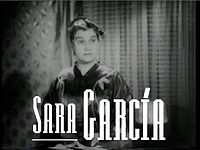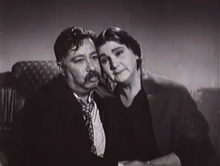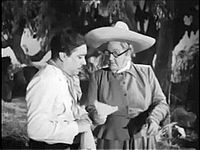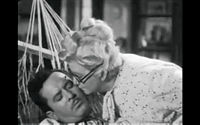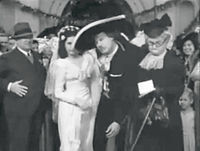- Sara García
-
Sara García 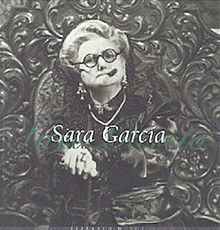
Sara Garcia, Mexico's Grandmother (Abuela)Born Sara García Hidalgo
September 8, 1895
Orizaba, Veracruz, MexicoDied November 21, 1980 (aged 85)
Mexico City, MexicoOccupation Actress Spouse Fernando Ibáñez (m. 1918–1923) Sara García (September 8, 1895 – November 21, 1980) was a Mexican actress who made her biggest mark during the "Golden Age of Mexican cinema". During the 1940s and 1950s, she often played the part of a no-nonsense but lovable grandmother in numerous Mexican films. In later years, she played parts in Mexican telenovelas.
Known as "Mexican Cinema's Grandmother", García's image is displayed on the label of Mexico's traditional Abuelita chocolate, a company now owned by Nestlé.
Contents
Early life
García was born Sara García Hidalgo[1] to Andalusian parents, Isidoro García Ruiz, an architect, and his wife Felipa Hidalgo de Ruiz. Her father was hired for various jobs in Veracruz, where they arrived, having just come from Havana, Cuba. García was the only survivor of their eleven children. In 1900, her mother died of typhoid fever which García had caught first and her mother caught from her.[2]
Early career
García started her film career at 22 when she was a teacher at a Catholic school for girls, where she served as a substitute art professor. She is said to have been a talented painter in those days. One day she noticed that in a small building in Mexico City a film was being produced by newly founded film company Azteca Films. The 1917 silent, black and white feature film was Alma de Sacrificio (Soul of Sacrifice), the first production of Azteca Films, which was one of the very first Mexican film production companies.[3] The leading lady was stage actress turned film producer (and writer, actress, editor and, maybe director) Mimí Derba. After screening tests she was offered a contract and a role as an extra in the film. She accepted although she did not mention it to her employers for many months. She appeared in two more films that year as an extra.
Theatrical career
García's film appearances lead to the theater. She began in the theater playing minor roles. However, during her early acting experiences, her natural talent and strong voice on the stage soon led to ten years acting on stage with the theater company Compañía de Comedia Selecta at the Theater Virginia Fábregas, which was the top theater group in Mexico of the time. There she shared the stage with Eduardo Arozamena, Sara Uthoff, Mercedes Navarro, Prudencia Grifell and the sisters Anita and Isabel Blanch, who were among the most prominent Mexican stage actors of the time.[4] García's stage career took her all over Mexico and Central America. During these travels she met her husband, Fernando Ibáñez though the actress, Mercedes Navarro. She gave birth to their daughter, Fernanda Mercedes Ibáñez during a stop in Tepic, Nayarit.
Golden Age of Mexican cinema
Filmmakers often solicited her to play movie roles during those years. However, she interrupted her stage career to appear in only one film between 1918 and 1933. García appeared in the film Yo soy tu padre ("I Am Your Father") in 1927. Six years later, however, she returned to the screen full time in El vuelo de la muerte ("Death Flight") in 1933. She then began a very long career of 148 films. Her first starring role was in the 1936 film Así es la mujer ("A Woman is Like That"); that film was followed by No basta ser madre ("It is Not Enough to be a Mother") (1937), in which her daughter Fenanda also appeared. The two then appeared in Por mis pistolas ("By My Pistols") in 1938 and Papacito lindo ("My Handsome Dad") in 1939.
Almost from the start, Sara García played the parts of mothers and grandmothers, García started a long series of films co-starring with the brightest stars of the cinema of Mexico, such as Cantinflas, Domingo Soler, Joaquín Pardavé and two with Prudencia Grifell as the Vivanco sisters.
Namesake of "la abuelita de México
Film actress Emma Roldán suggested Sara García for the role of "doña Panchita", an old woman, in the 1940 film Allá en el trópico ("There in the Tropics").[5] The film's director Fernando de Fuentes considered that García was too young for the part (indeed she was in her mid 40s) but Roldán replied him saying "Sara is an actress, and actresses don't have an age".[5] For the screen test, García had a wig made for her but she had already had her teeth removed for a theatrical play.[5] At the time of the screen test, the director asked the crew of her whereabouts and they answered that she was the woman in front of him, the director was shocked: her wig, lack of teeth, and performance had touched him.[5] It is in Fernando de Fuentes' Allá en el trópico where Sara García won her title of la Abuelita de México (Mexico's Grandmother).[5]
Collaborations with Joaquín Pardavé
In 1942, García co-starred with Joaquín Pardavé in El baisano Jalil, a comedy film where she portrays the matron of a Lebanese-immigrant family. For the part, Sara García was not dressed as an old woman, but in her normal garb with makeup to resemble an middle-eastern woman. García again starred with Joaquín Pardavé in a similar comedy, El barchante Neguib (1945). In both films García is a matriarch of a Lebanese-Mexican family and for the roles she and co-star Pardavé share a similar "arab" accent in which the pronunciations of "p" and "m" are substituted with "b" sounds. Therefore the words "paisano" and "marchante" are the mispronounced and misspelled in the films' titles.
Starring with Pedro Infante
She co-starred many times in "Golden Age of Mexican cinema" films as the grandmother of famous Mexican actor Pedro Infante. Pedro was (and is) so well known and popular that they call him the "idol" (el idolo).[6] She was famous in these films for always having a cigar in her mouth and frequently, when mad, delivering quick blows with her ever-present walking stick to the posterior of her rolly polly servant named "Bartolo" (Fernando Soto).[7] The firm upturn of her jaw in the famous photo of her above shows her feisty but lovable nature in her films. For instance, after she dies in one of her films, Pedro Infante, playing the role of her grandson, forces a Mariachi band at gun point to accompany him to her newly dug grave in a heavy downpour for them to play while he tearfully tells her how much he loves and misses her.[8]
In her Golden Age movies with Pedro Infante, she often played the part of the stern grandmother who constantly tried to get her adult good-timing grandson to behave. She would often take fully grown Pedro Infante by the ear like a child, when she was mad at him. However, while she never would show it, she loved him deeply. These two photos summarize their repeated screen relationship perfectly.[citation needed] In this first scene from the 1949 Mexican movie Dicen Que Soy Mujeriego (They Say I am a Womanizer), she takes Infante by the ear at his own wedding when he pays too much attention to a passing beauty. In the second scene, by contrast, she kisses him tenderly and whispers to him lovingly in Spanish "If only you weren't a playboy [Mujeriego]", while he is asleep.[9]
In addition to Pedro Infante, she co-starred with almost the entire cast of Mexican movie stars from the 1930s to the 1970s. She came to be known as "Mexico's Grandmother" (Abuela).[10]
Personal life
She married Fernando Ibáñez in 1918. However, García and her husband divorced in 1923. Their daughter, actress María Fernanda Ibáñez died of typhoid fever in 1940 at the beginning of a promising film career.
Later years and death
García had her own television show in 1950, Media hora con la abuelita, but this was not a success and was cancelled. She returned to television in 1960 when she obtained a role in her first of eight telenovelas, which include Mundo de juguete in 1974, which as of this date (early 2006) the longest-running telenovela in history, and in Viviana with Lucía Méndez.[4]
García retired at the age of 65 (how did she retire at the age of 65 when in 1974 she was 79 years old?) .[11] On November 21, 1980,[1] she fell down some steps striking her head. She was rushed to the hospital, where she died.
She was buried while the song "Mi Cariñito" ("My Little Darling/Beloved One") was played. The significance of this song is that Pedro Infante sang it to Sara several times in their movies. Particularly, he sang it drunk and tearful as a lament after Sara died in the movie Vuelven Los Garcia (The Garcias Return).[12][13][14] She is buried with her daughter in the Panteón Español cemetery in Mexico City.
Filmography
Telenovelas
- Viviana (1978) as Doña Angustias
- Mundo de juguete (1974) as Granny Tomasita
- Mi rival (1973) as Chayo
- Telenovela mensual (1972)
- Mi maestro (1968)
- El padre Guernica (1968)
- Anita de Montemar (1967)
- La duquesa (1966) as the Duchess
- La gloria quedó atrás (1962)
- Un rostro en el pasado (1960)
Television shows
- Media hora con la abuelita (1952)
Documentaries
- México de mis amores (1976)
- La vida de Pedro Infante (1963)
- Recordar es vivir (1940)
Films
Cinema of Italy
- Los dinamiteros (L'ultimo rififi) (1962) as doña Pura (co-produced with Spain)
Cinema of Spain
- Así era mi madre (Bello recuerdo) (1961) as the granny
Cinema of the United States
- The Living Idol (El ídolo viviente) (1955) as Elena (co-produced with Mexico)
Cinema of Mexico
- Sexo vs. sexo (1980) as the old bouncer lady
- Como México no hay dos (1979)
- La vida difícil de una mujer fácil (1977)
- La comadrita (1975) as doña Chona
- Nobleza ranchera (1975) as Altagracia
- Como gallos de pelea (1975) as doña Altagracia
- El hijo del pueblo (1973) as Vicenta Aurelia Fernández
- Valente Quintero (1973) as Elvira Peña de Carillo
- Fe, esperanza y caridad (1972, episode Caridad) as the old rich lady
- Nosotros los feos (1972) as doña Sara García viuda de García y García
- Los Leones del Ring contra la Cosa Nostra (1972) as doña Refugio
- Los Leones del Ring (1972) as doña Refugio
- Entre monjas anda El Diablo (1972) as sor Lucero
- Mecánica nacional (1971) as doña Lolita (granny)
- Nadie te querrá como yo (1971) as the granny
- Fin de fiesta (1971) as doña Beatriz
- La inocente (1970) as the granny
- La hermana dinamita (1969) as madre Ana
- La casa del farol rojo (1969) as doña Sara Morales viuda de Mendoza
- El día de las madres (1968) as doña Carmen
- ¿Por qué nací mujer? (1968) as doña Rosario Fernández de Cervantes
- Sor Ye Ye (1967) as sor María de los Ángeles
- Flor marchita (1968) as Paula
- No se mande, profe (1967) as doña Claudia
- Las amiguitas de los ricos (1967) as Luz Romero
- Un novio para dos hermanas (1966) as señora Cáceres
- Seis días para morir (1966) as doña Mercedes
- Joselito vagabundo (1965) as tía Guadalupe
- Los dos apóstoles (1964) as doña Angustias
- Nos lleva la tristeza (1964) as doña Marina Guerra viuda de Batalla
- Escuela para solteras (1964) as doña Bernarda
- Canta mi corazón (1964) as doña Berta
- Héroe a la fuerza (1963) as Prudencia
- Nos dicen las intocables (1963) as doña Cucaracha
- Los fenómenos del futbol (1962) as doña Pancha
- Las Chivas Rayadas (1962) as doña Pancha
- Ruletero a toda marcha (1962) as doña Sarita
- El caballo blanco (1961) as señora Refugio Arteaga
- Las hijas del Amapolo (1960) as la abuela
- El analfabeto (1960) as doña Epifanita
- El malvado Carabel (1960) as tía Elodia
- Paloma brava (1960) as doña Chabela o "Doña Popotitos"
- El buena suerte (1960) as doña Paz
- ¡Mis abuelitas... nomás! (1959) as doña Casilda
- El proceso de las señoritas Vivanco (1959) as Hortensia Vivanco y de la Vega
- Yo pecador (1959) as nana Panchita
- Con el dedo en el gatillo (1958, episode El anónimo) as the granny
- Las señoritas Vivanco (1958) as Hortensia Vivanco y de la Vega
- Los Santos Reyes (1958) as the old lady
- El gran premio (1957) as Soledad Fuentes Lagos "Cholita"
- Pobres millonarios (1957) as doña Margarita del Valle
- La ciudad de los niños (1956) as doña Juliana
- El inocente (1955) as madre de Mané
- La tercera palabra (1955) as Matilde
- El crucifijo de piedra (1954) as Laura
- El hombre inquieto (1953) as Fátima
- Los Fernández de Peralvillo (1953) as doña Chita
- Los que no deben nacer (1953) as Clotilde
- Sólo para maridos (1952) as Concordia
- Genio y figura (1952) as doña Luisa
- El lunar de la familia (1952) as doña Luisa
- Por el mismo camino (1952) as Justa
- Misericordia (1952) as Benigna
- La miel se fue de la luna (1951) as doña Martirio
- Acá las tortas (1951) as Dolores
- La duquesa del Tepetate (1951) as Chonita
- Doña Clarines (1950) as Clara Urrutia "Doña Clarines"
- El papelerito (1950) as Dominga
- La reina del mambo (1950) as tía
- Yo quiero ser tonta (1950) as Atilana
- Mi querido capitán (1950) as Pelancha
- Azahares para tu boda (1950) as Eloísa
- Si me viera don Porfirio (1950) as doña Martirio
- Mi preferida (1950) as doña Sara
- Yo quiero ser hombre (1949) as auntie Milagros
- Dos pesos dejada (1949) as Prudencia
- El diablo no es tan diablo (1949) as doña Leonor
- Novia a la medida (1949) as doña Socorro
- Eterna agonía (1949) as doña Cholita
- Dicen que soy mujeriego (1948) as doña Rosa
- Tía Candela (1948) as Candelaria López y Polvorilla "Tía Candela"
- La familia Pérez (1948) as Natalia Vivanco de Pérez
- Dueña y señora (1948) as Toña
- Mi madre adorada (1948) as doña Lolita
- Vuelven los García (1946) as doña Luisa García viuda de García
- Los tres García (1946) as doña Luisa García viuda de García
- El ropavejero (1946) as María
- Los que volvieron (1946) as the mature wife
- Sucedió en Jalisco (Los cristeros) (1946) as doña Engracia
- El barchante Neguib (1945) as Sara
- Mamá Inés (1945) as Inés Valenzuela
- ¡Ay qué rechulo es Puebla! (1945) as the happy old lady
- La señora de enfrente (1945) as Lastenia Cortazano
- Escuadrón 201 (1945) as doña Herlinda
- Como yo te quería (1944) as Remedios Mantilla
- El jagüey de las ruinas (1944) as doña Teresa "Mamanina"
- Tuya en cuerpo y alma (1944) as María Antonia
- El secreto de la solterona (1944) as Marta
- La trepadora (1944) as doña Carmelita
- Mis hijos (1944) as María
- Toros, amor y gloria (1943) as Irene
- Caminito alegre (1943) as Antonia Goyena
- No matarás (1943) as Aurora
- Resurrección (1943) as Genoveva
- El verdugo de Sevilla (1942) as doña Nieves
- El baisano Jalil (1942) as Suad
- Historia de un gran amor (1942) as doña Josefa
- La abuelita (1942) as doña Carmen
- Regalo de Reyes (1942) as doña Esperanza
- Alejandra (1941) as Elena
- La gallina clueca (1941) as Teresa de Treviño
- Dos mexicanos en Sevilla (1941) as Gracia
- ¿Quién te quiere a ti? (1941) as the seducer's mother
- Cuando los hijos se van (1941) as Lupe de Rosales
- Las tres viudas de papá (1940) as Petra
- Papá se enreda otra vez (1940) as Petra
- Al son de la marimba (1940) as Cornelia
- Papá se desenreda (1940) as Petra
- Ahí está el detalle (1940) as Clotilde Regalado
- Mi madrecita (1940) as la madre
- Allá en el trópico (1940) as doña Panchita
- Miente y serás feliz (1939) as Constancia
- En un burro tres baturros (1939) as Manuela
- Papacito lindo (1939) as Remedios
- Calumnia (1939) as Eduviges
- Los enredos de papá (1938) as Petra
- Su adorable majadero (1938) as Mariquita
- El capitán aventurero (Don Gil de Alcalá) (1938) as Catalina, corregidora
- Perjura (1938) as doña Rosa
- Padre de más de cuatro (1938) as doña Gertrudis
- Dos cadetes (1938) as Dolores
- Pescadores de perlas (Sol de gloria) (1938) as Juana
- Por mis pistolas (1938) as
- No basta ser madre (1937) as Sebastiana del Puerto
- La honradez es un estorbo (1937) as doña Refugio
- No te engañes corazón (1936) as doña Petro
- Malditas sean las mujeres (1936) as señora de Ambrosaliet
- Las mujeres mandan (1936) as Marta
- Marihuana (El monstruo verde) (1936) as Petra
- Así es la mujer (1936) as the widow
- ¡Viva México! (El grito de Dolores) (1934) as doña Josefa Ortiz de Domínguez
- La sangre manda (1933) as the neighbor
- El vuelo de la muerte (1933)
- El pulpo humano (1933)
- Yo soy tu padre (1927) as extra
- La soñadora (1917) as extra
- Alma de sacrificio (1917) as extra
- En defensa propia (1917) as extra
Footnotes
- ^ a b (Spanish) Estrellas de Cine Mexicana
- ^ Biography of Sara Garcia
- ^ Some sources say her first movie was En Defensa Propia (In Self Defense) Filmography of Sara Garcia.
- ^ a b (Spanish) Las Noticias Mexico
- ^ a b c d e Roberto, Luis. "Biografía de Sara García". http://www.network54.com/Forum/223031/message/1041878692/Biograf%EDa+de+Sara+Garc%EDa. Retrieved 11 September 2011.
- ^ Chavez, Denise, "Loving Pedro Infante", Farrar, Straus and Giroux, New York, 2001, p. 5).
- ^ (Spanish) Sara Garcia using trademark walking stick on Bartolo in Dicen Que Soy Mujeriego (at 4.37)
- ^ (Spanish) Grave scene from Vuelven Los Garcia (at 3.23)
- ^ (Spanish) Kiss in "Dicen que Soy Mujerigo"(at 1.51)
- ^ Mexico's Grandmother
- ^ Erickson, Hal. "Sara Garcia Biography". allmovie. http://www.allmovie.com/artist/sara-garcia-25864. Retrieved 2009-10-29.
- ^ Mi Cariñito Pedro at party for Sara
- ^ Mi Cariñito Pedro begging forgiveness from Sara
- ^ Mi Cariñito Pedro drunk and grief stricken after Sara dies in movie
External links
- Sara García at the Internet Movie Database
- Biography at hispanodetulsa.com (Spanish)
- Sara García at the Cinema of Mexico site of the ITESM (Spanish)
- Sara García at Find a Grave
Categories:- Mexican actors
- Mexican film actors
- Mexican stage actors
- Mexican telenovela actors
- Mexican television presenters
- Mexican people of Spanish descent
- People from Orizaba
- 1895 births
- 1980 deaths
- Golden Age of Mexican cinema
Wikimedia Foundation. 2010.

